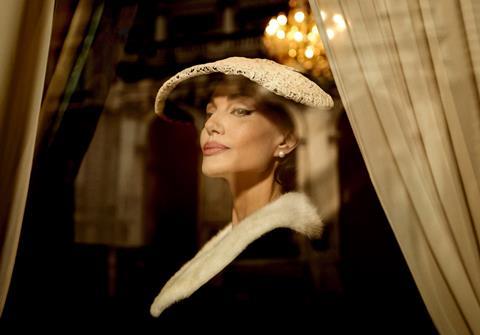Angelina Jolie hits the notes as opera legend Maria Callas in Pablo Larrain’s latest biopic

Dir. Pablo Larrain. US/Italy/Germany, 2024. 118mins
The word diva comes from opera and, in the world of opera, Maria Callas owned it. Having made films on Jacqueline Kennedy (Jackie) and Princess Diana (Spencer) Pablo Larrain tunes his ears to the myth of Callas, played here by Angelina Jolie. Larrain uses the familiar narrative structure of the flashback and adds some operatic grace notes to deliver a performance-led film that is never less than expected – but also never less than watchable.
The film’s saving grace is a sense of elusiveness and the unexpected
Maria Callas, born Maria Kalogeropoulos, was a woman of unique talent, made famous entirely by her own ability – and that gives the director more to work with than Jacqueline and Diana, neither of whom had to sing for their supper. Yet Larrain’s dependence on sets and costuming, as also evidenced in his earlier biopics, is a heavy fur coat for Jolie to shrug off, and Maria is a film of beautifully-lit cheekbones where impersonation jostles with performance. (The vocals are multi-layered tracks, so there is always something of Jolie’s voice in there). Expect acting and craft awards notice after the film was picked up by Netflix on its Venice bow, while Jolie, who palpably brings similar life experience of being talented, troubled in love and hunted by the paparazzi to the project, will add an extra level of curiosity. .
More than a biopic and yet not quite a radical retake on those conventions, Maria starts out in Callas’s apartment on September 16, 1977, the day of her death aged 53. (Her performing career had died long before due to vocal strain, possibly as a result of extreme weight loss.) The film immediately cuts to a black-and-white close-up of Jolie performing as Callas – the Sinead O’Connor Nothing Compares shot, if you will, with all muscles straining – before jumping back in time by a week. Callas is seen popping pills, tending to her dogs and being cared for by her butler and housekeeper (Pierfrancesco Favino and Alba Rohrwacher). Mostly, they try to get her to eat and attend doctor’s appointments, while she focuses on her supply of the sedative Mandrax.
Mandrax — clunkily personified in the shape of a reporter called Mandrax (Kodi Smith McPhee), who may or may not exist – provides a woozy connection to Callas’s past as she drifts in and out of her reminiscences and further flashbacks. These include to her youth in Greece (although she was born in New York), her time with her great love Aristotle Onassis (Haluk Bilginer), who left her for Jacqueline Onassis, and the extraordinary performances of her career. Larrain emphasises the sadness of diva-dom; as a film, Maria lacks the fire of any of Callas’s famous roles although, like them, it’s clearly a tragedy from the onset.
Callas’s present is delivered in colour, with flashbacks in artificially-aged stock, while the past – Onassis and the Nazis – comes in redolent black and white (including a scene with JFK). If you’d imagined that any film of Callas’s life would inevitably climax in a thundering rendition of ‘Tosca’, well, there’s no surprises here. Working again with Spencer screenwriter Steven Knight, Larrain is out for audiences, not the dress circle at La Scala. Larrain’s take on Callas is to examine how such a huge talent – or the loss of it – can be an unbearable burden on a person, condemning them to a life of pain.
This may be true — Larrain and Jolie would know better, perhaps, from personal experiences – but it does make for a sustained down note on a life which, although challenging, was well-lived. Callas had a big personality, after all. The film depicts her as entirely alone, her sister Jackie (Valeria Golina) used to deliver drugs, her serving staff and accompanist and a fake reporter her only friends. Jolie plays Callas with those cheekbones to the fore, a wistful hauteur and an ease in delivering one-liners which will delight the legions of Callas fans who still swoon to her recordings. “I’m not hungry,” she tells a waiter. “I come to restaurants to be adored.”
The film’s saving grace is a sense of elusiveness and the unexpected even within its familiar structure. Larrain leans into Jolie’s aimlessness as she wanders around Paris by creating scenes and memories that take place only in her mind, and adding orchestras which spring to life across the city to usher in ’Madame Butterfly’, for example, in the rain. These are beautiful tableaux, complete with costuming and score to satisfy any devotee at Covent Garden. Ultimately, there’s a cumulative weight to her tragedy, and the unique beauty of her art, that moves. ’Tosca’’s fate may be inevitable, but Callas’s ‘Tosca’ is something else.
Production companies: The Apartment. Komplizen, Tabula
International sales: FilmNation
Producers: Juan De Dios Larrian, Jonas Dornbach, Lorenzo Mieli, Pablo Larrain
Screenplay: Steven Knight
Cinematography: Ed Lachman
Production design: Guy Hendrix
Editing: Sofia Subercaseaux
Music: John Warhurst
Main cast: Angelina Jolie, Pierfrancesco Favino, Alba Rohrwacher, Haluk Bilginer, Kodi Smit-McPhee, Stephen Ashfield, Valeria Golino, Caspar Phillipson






![The Brightest SunScreen[Courtesy HKIFF]](https://d1nslcd7m2225b.cloudfront.net/Pictures/274x183/3/5/0/1448350_thebrightestsunscreencourtesyhkiff_312678.jpg)















![The Brightest SunScreen[Courtesy HKIFF]](https://d1nslcd7m2225b.cloudfront.net/Pictures/100x67/3/5/0/1448350_thebrightestsunscreencourtesyhkiff_312678.jpg)

